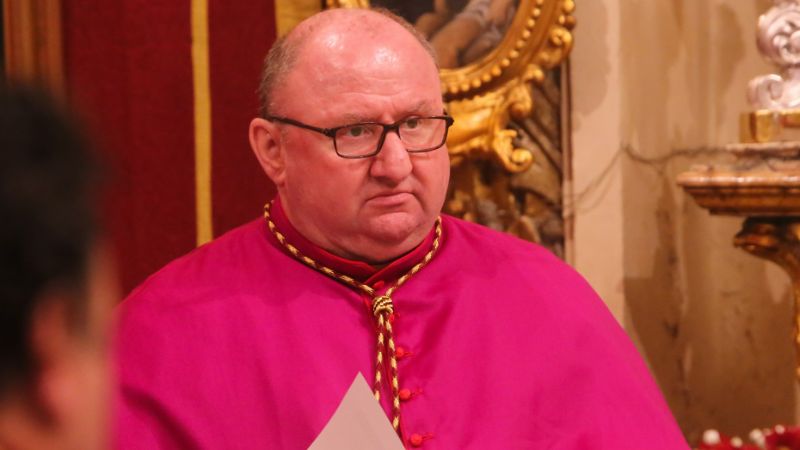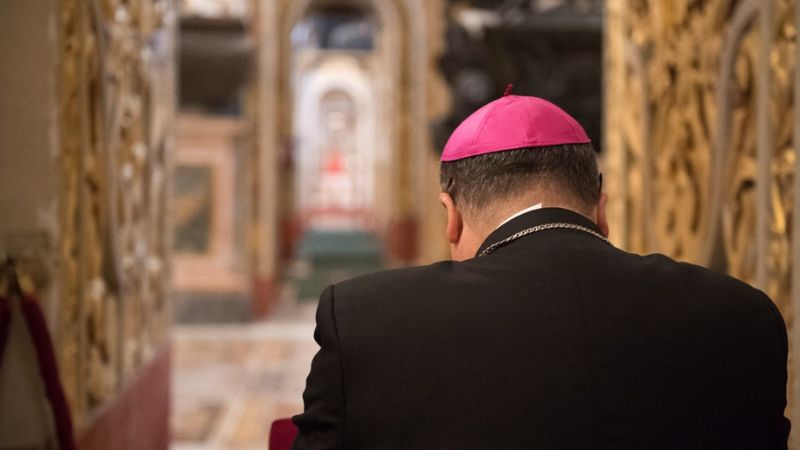Archbishop Charles Scicluna has not consulted the Church’s main decision-making body, which decides all policy and financial decisions of the Maltese Archdiocese, on the controversial proposal that its bank is discussing a possible takeover of HSBC Malta.
Speaking on the Church’s radio, Canon David Cilia, the Archpriest of Valletta’s St Paul’s Shipwreck parish, harshly criticised the Curia for its lack of consultation.
He said that as a member of the Kunsill Rapprezentattiv Diocesan, the Church’s main decision-making body, he was surprised to learn about the latest APS move through the media.
Canon Cilia warned that, according to the rules, the Council has the final say, and the Archbishop must ask for its consent for APS to proceed with its discussions.
“Decisions by the Council are not an option and bind the Archbishop on any financial policy. As a member of this Council, I expected the Archbishop to bring this discussion to our attention first,” he said.
“If it is true that discussions on the possible HSBC acquisition have been ongoing since January 2023, as has been reported, we are just putting the cart before the horse. We (the Council) have to consent, and if we disagree, the Church and APS are just wasting our time and money,” the well-respected Cilia told radio host Andrew Azzopardi.
Canon Cilia made it clear that he disagreed with APS acquiring HSBC, as he believed this would harm the Church and its credibility.
“We are not bankers, and this is not the Church’s core business,” Canon Cilia said.
He insisted that while it was good that the Church had its bank to be independent and take care of its patrimony, it should not own a bank that controls half the economy.

Canon David Cilia.
“We got rid of the Church’s lands to avoid scandals affecting our reputation. Is it so hard to think that if we do this and control half of the economy, we will be risking our credibility?” he asked.
“This is not in the interest of the Church as we need to remain credible and focus on our mission,” he insisted.
Canon Cilia praised the Gozo Bishop for taking a stand against the APS acquisition and said, “This shows that the Gozo Bishop has his heart in the right place.”
APS is Malta’s third largest bank, and according to leaked reports, it is currently discussing taking over HSBC Malta’s operations.
Although it is known that APS lacks the financial strength to make this acquisition, it is not excluded that HSBC is negotiating a deal to enable it to leave the Maltese banking sector.
The government is informally against the deal, but the European Central Bank will make the final decision if an agreement is reached.
The Maltese Curia controls the bank through 55.2% of its shares, while the Gozo Diocese has another 12.7% stake. Small shareholders hold the rest of the shares on the Malta Stock Exchange.
So far, Archbishop Sciclina has not commented on the discussions and has avoided declaring his position.














This attitude is the last straw in the disgusting behaviour of the maltese church, who doesn’t give a penny towards the emarginated fanatics. Alk it cares about is itself and nothing else. If only could jesus come back and give an OVERHAUL TO HIS SECT. HOWEVER, THUMBS UP FOR THE COURAGE MONS. SHOWED IN HIS CRITICISMS. Not so many like him. 💯👍
Mr Tabone Adami, the KRD is not only the consultative organ of the Church. It binds the Archbishop on any financial decision it makes. The Archbishop is part of the KRD. So, why would he not consult it? (And) Do you believe that it is the Archbishop himself who is carrying out the discussions and the deals, if any are being carried out? Who are the people behind these discussions? The KRD represents the interests of all members of the Church in their different roles to secure transparency in financial matters carried out by the Church through the Curia officials. We see no transparency here and, no, financial matters are never the discretion of one person, even if he is a Bishop.
It is useful to remember that the Catholic Church, by its very nature, is a hierarchical institution under the direction of the Pope and the Bishops – and not one run by a Board of Directors on which the Bishop of the diocese sits as Chairman.
It is against this background that one has to consider his position, irrespective of the function entrusted to him by the Bishop to assist him, in one way or another, in his pastoral care..
As far as I am aware, the canonically appointed Head of any particular diocese is the Bishop nominated by the Pope – and not the Diocesan Representative Council.
I would submit that it is in his discretion as to when he sees it prudent to discuss proposals, if any have been made at all, about what may or may not come to fruition in the long run.
Have you ever heard of the emphasis, documents and encyclicals of post Vatican II Councilregarding the synodal church or are you still in the feudal times?